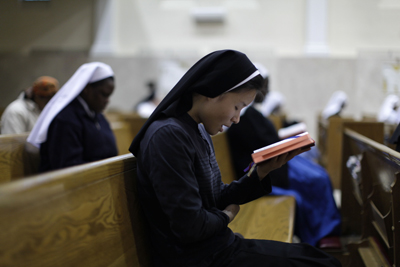
(RNS1-OCT15) Sister Mary Francis of Vietnam prays during chapel service at Assumption College for Sisters in Mendham, N.J. Nearly half of the school’s 54 students are from Africa or Asia. For use with RNS-NUNS-COLLEGE, transmitted Oct. 15, 2010. RNS photo by Matt Rainey/The Star-Ledger.
MEDHAM, N.J. (RNS) At first, the place looks like an artist’s — or marketer’s — conception of an ideal college campus. More than 100 acres of groomed and wooded land, just now bearing the red and yellow tinges of fall. Out of the natural beauty rises an imposing central building, its white cupola directing approaching visitors to an ornate entrance.
Yet something is missing. Some things are missing.
Chattering students socializing on pathways, for example. And noise. Music. Frisbee tossing on the great lawns. Posters inviting students to lectures or concerts. Athletic facilities.
It is a college, but certainly not a typical one.
“I don’t think any college has our mission,” says Sister Joseph Spring, the unassuming president of Assumption College, who’s led the school for two years after a career in elementary and secondary Catholic education.
“This is a campus, but it’s in a convent environment,” she says. The building that houses the college also houses the motherhouse of her religious order, the Sisters of Christian Charity.
The fully accredited Assumption College for Sisters has only 54 students, 25 of whom are members of religious women’s communities in Vietnam, Tanzania, South Africa, Kenya and other countries. The rest are Americans thinking about, or committed to, becoming sisters, most likely in the religious order that owns and operates the school.
It was founded as an extension of Seton Hall University, then became independent in 1953. Declining interest in religious vocations cut enrollments. In 1996, it remade itself with a specialty — training nuns from other nations to become leaders of their communities.
“They will leave here and earn four-year degrees, but then they must return to their homes,” said Sister Joseph. They become mostly teachers and nurses, she says, but because of their American education, they will soon be running schools and hospitals.
The college, licensed by the state to offer associate degrees, has no athletic teams, no organized extracurricular activities.
It does have a student center — a large room with a television and a score of recliners. Sister Joseph stands there and notes the obvious: like the pathways, the center is empty, although not all students have classes.
“They work too hard,” she says of her students.
Sister Joseph looks at the empty recliners. “The furniture is all gently used, given to us as donations — we’re frugal.”
Frugal indeed. The entire annual budget is under $400,000, less than what the president of Rutgers University — New Jersey’s state university — makes in yearly salary, and a fraction of what the school pays its football coach each year.
Aside from tax exemptions provided to all colleges, it receives no public support, no federal or state subsidies, no help from a diocese. “All our money comes from private donations,” she said.
The college has friends, earned by the historic work of the sisters from the religious order educating poor Catholic children who became successful and have successful friends. They raise money every year and, this year, they are redoubling their efforts with a series of annual concerts.
“I would not be where I am now without these nuns,” says Michael Critchley, a prominent criminal defense attorney — and a friend of Assumption College. As a child, he attended St. Augustine’s school in Newark, operated by Sister Joseph’s order.
Critchley has been joined by a number of others, including entrepreneurs and philanthropists and local politicians. The invitation to this year’s inaugural concert featuring Irish tenor Ronan Tynan suggests sponsorship donations ranging from $5,000 to $25,000.
Those friends, as well as the decision to become international, saved the college.
“Can you imagine trying to run this place with five students?” asks Sister Joseph. The main building can house some 200; it has 85 residents, including students and members of the order.
“The students saved us, but we think we are giving back to the world competent leaders.”
(Bob Braun writes for The Star-Ledger in Newark, N.J.)




